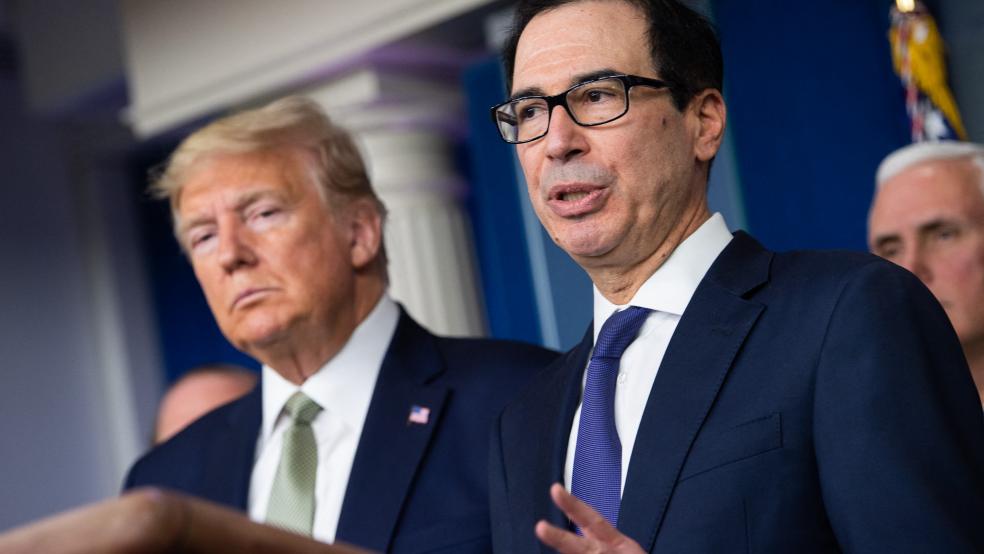As U.S. economic activity screeches to a halt due to the coronavirus pandemic, the Trump administration is asking Congress for a massive, rapidly evolving stimulus package that will likely top $1 trillion.
“We’re going big,” Trump told reporters Tuesday at a White House briefing. “We want to go big.”
‘Americans need cash now’: At the heart of the plan is a push to send many Americans cash payments, and quickly.
“Americans need cash now, and the president wants to give cash now. And I mean now, in the next two weeks,” Treasury Secretary Steven Mnuchin said at Tuesday’s briefing.
The administration reportedly has not decided how large the checks would be but wants them to top $1,000. Mnuchin indicated that high-income households may not be eligible. “I think it’s clear we don’t need to send people who make a million dollars a year checks,” he said. The threshold is likely to be far lower than that, around $75,000 to $85,000, CNN reports.
The first wave of checks would cost the government $250 billion, according to CNN. But cost considerations are being set aside as the administration looks to mitigate the economic damage from the pandemic. Mnuchin reportedly said Tuesday the Congress could worry about deficits at a later date.
“Cobbling together a stimulus package worth more than $1 trillion would mark a major ideological shift for Republicans, who spent years decrying debt and government bailouts following the 2008 global financial crisis,” Politico’s Nancy Cook and Ben White noted. “But with uncertainty surrounding the spread of the coronavirus and the volatility in the stock market, the White House does not seem concerned about the price tag — only stopping the financial freefall.
The administration proposal reportedly also includes $200 billion for expanded loans to small businesses plus $50 billion in aid to the airline industry.
Tax day payments are getting delayed: Mnuchin also announced Tuesday that the tax payment deadline will be pushed back 90 days after April 15, with individual taxpayers who owe up to $1 million able to defer payments without incurring penalties or interest. Taxpayers will still have to file by April 15, however.
Multiple phases of coronavirus relief: Cash payments would be part of a third phase of coronavirus relief being negotiated now by Mnuchin and congressional leadership.
President Trump had been pressing for a temporary payroll tax cut, but lawmakers were cool to the idea, and the president on Tuesday indicated that he would prioritize the cash payments as he seeks faster action. “Payroll tax is one way, but it does come over a period of months, many months,” he told reporters. "And we want to do something much faster than that. So I think we have ways of getting money out pretty quickly and very accurately.”
The White House wants the next phase of stimulus to also include support for businesses and aid for the airline industry, which on Monday asked the government for as much as $60 billion in grants and loans.
Mnuchin reportedly has discussed the idea of combining the new stimulus measures with the revised relief package now being considered by the Senate after passing the House on Monday night. That legislation provides for paid sick and family leave and free virus testing as well as enhanced unemployment benefits, increased food aid and higher funding for Medicaid benefits. But Senate Majority Leader Mitch McConnell said Tuesday he would bring the House bill up for a separate vote before proceeding with the larger stimulus package.
"A number of my members think there were considerable shortcomings in the House bill. My counsel to them is to gag and vote for it anyway," he said.
McConnell also said he would keep the Senate in session until the third phase is completed.
It’s not clear yet whether the White House’s proposal will be able to speed through Congress, though, as Democrats have expressed concern that the administration’s plans thus far have centered on tax cuts and industry bailouts. Senate Minority Leader Chuck Schumer is pitching a stimulus of at least $750 billion that would provide more money for health care and schools, expand unemployment insurance and provide loan assistance, among other things.
“There is emerging tension between the White House’s approach and the bills Democrats are trying to advance,” The Washington Post reported. “White House officials are leaning hard into the idea of tax cuts and industry assistance, while Democrats have said their proposals are focused more on helping workers, health care providers, schools, and senior citizens.”





